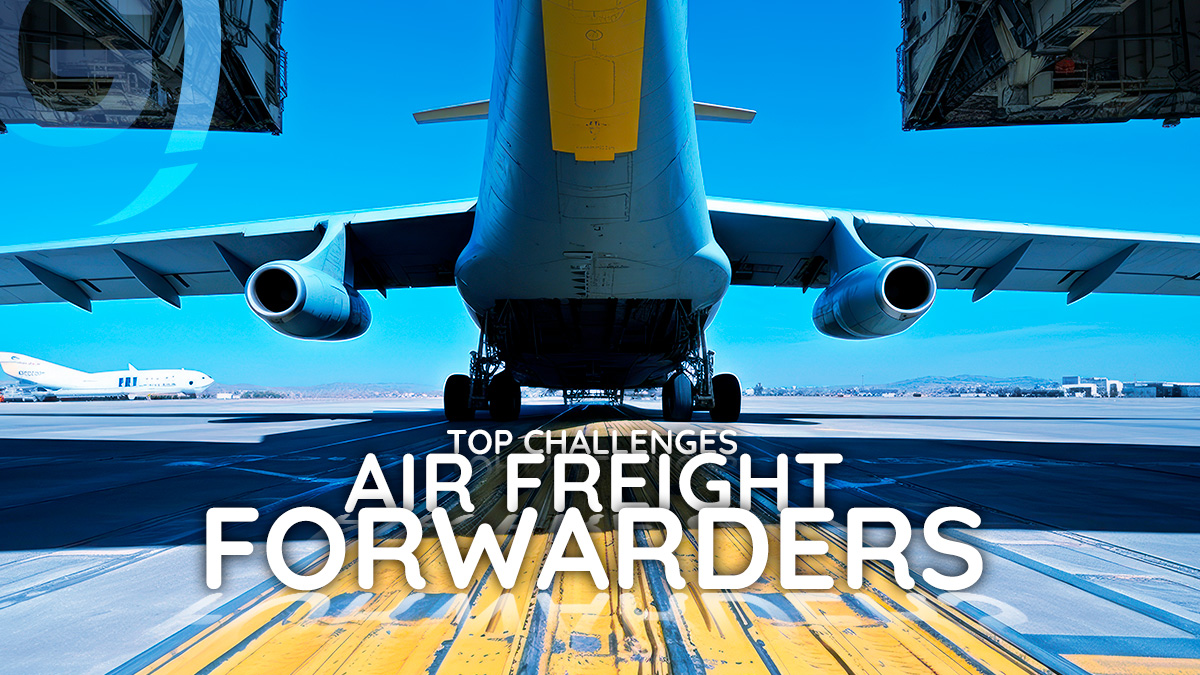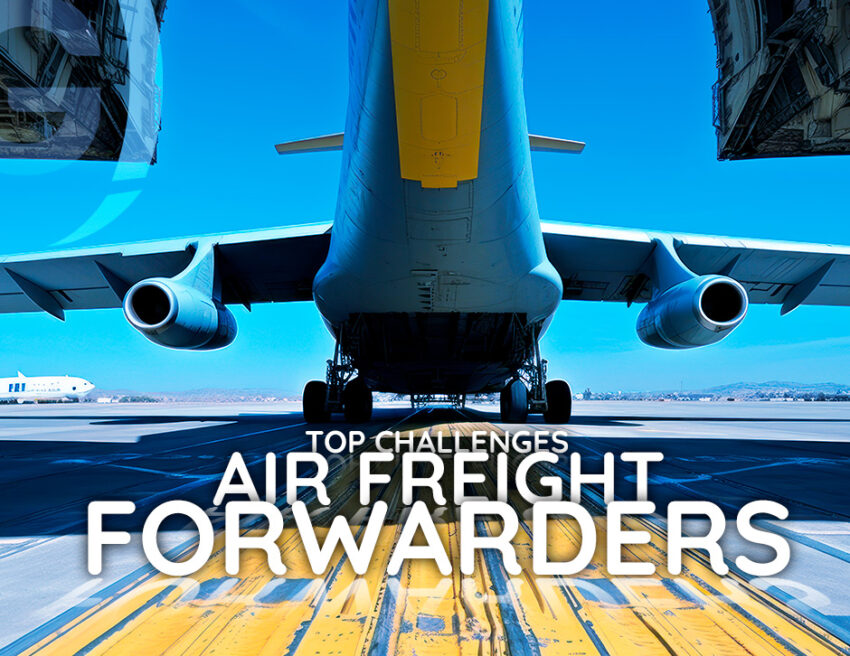Air freight stands out as the fastest, most reliable, and better-serviced mode of transportation when compared to other alternatives. Despite its relatively higher costs, air freight is the preferred choice for critical and high-value shipments, despite the challenges it presents. Some of the challenges air freight forwarders regularly face encompass cargo restrictions, limited processing time, frequent rate fluctuations, and the potential for substantial detention and demurrage costs, even for minor errors.
The air freight industry is characterized by intricate processes and operations, accompanied by a variety of challenges. This blog post aims to explore some of the primary challenges faced by air freight companies, offering insights into strategies that freight forwarders can employ to overcome these hurdles and ensure the smooth operation of their logistics processes.
Challenges faced by air freight forwarders
-
Space shortage
Air freight capacity constraints can arise from a range of factors, including limited aircraft availability, peak seasons, and volatile market conditions. These shortages can lead to heightened rates, restricted cargo space, and difficulties in meeting customer demand. To tackle this challenge, air freight forwarders can adopt several strategies. Firstly, they can explore strategic partnerships with multiple airlines to secure reliable capacity. Moreover, planning shipments well in advance is crucial, allowing for better coordination and allocation of available space.
Air freight companies should also try leveraging flexible scheduling options to enhance the ability to adapt to changing capacity scenarios. Collaborating with other freight forwarders who have well-established relationships with airlines is another effective approach. Such logistics partnerships can provide access to preferential booking arrangements and priority space allocations, helping businesses navigate capacity challenges more effectively in the dynamic air freight industry.

-
Documentation and customs clearance
Certainly, the most crucial advantage of air freight is its shortest transit time. However, this advantage also implies that freight operations must be equally fast, requiring efficient preparations such as loading, documentation, and clearance. Customs clearance plays a crucial role in air freight logistics, encompassing compliance with diverse regulations, documentation requirements, and import/export procedures. Delays or errors in the customs clearance process can result in shipment hold-ups, heightened costs, and dissatisfied customers. For this reason, air freight fowarders should focus on creating an experienced team that understands the intricacies of procedures and documentation and have the skills to address last-minute challenges.
It is also a good idea for logistics companies to collaborate closely with experienced customs brokers or freight forwarders possessing a profound understanding of customs regulations, maintaining accurate documentation, and having established relationships with customs authorities. The integration of automated systems, such as electronic data interchange (EDI), can further expedite the customs clearance process, enhancing efficiency and reducing the likelihood of delays or errors.
-
Complying with regulations
Regulatory compliance poses a continual challenge in the air freight shipping industry. Regulations pertaining to hazardous materials, restricted and dangerous goods handling, and customs requirements undergo frequent updates and are strictly enforced. To ensure regulatory compliance, freight forwarders should stay informed about the latest regulations, invest in comprehensive employee training programs, maintain accurate records, and implement robust quality control processes. For example, Globalia’s Essentials of Freight Forwarding course provided by CIFFA will train your workforce about every aspect of shipping dangerous goods along with other topics.
Joining forces with knowledgeable freight forwarders who possess expertise in regulatory compliance is a prudent strategy. Such partnerships can assist businesses in navigating the complexities of air freight logistics while ensuring adherence to legal requirements. By staying proactive and well-informed, companies can better manage regulatory challenges in the dynamic and highly regulated air freight industry.
-
Digitized air freight operations
The air cargo industry is presented with the imperative to capitalize on technological advancements more than ever before. The International Air Cargo Association (TIACA) has identified five critical priorities for the air freight sector to overhaul its operations and meet evolving customer demands. These priorities include Digitization, Sustainability, Collaboration, Security Enhancement, and Liberalization.
Handling and accurately completing paperwork is a critical responsibility for professional shippers before goods can be dispatched to their destinations. For instance, a safety data sheet (SDS) comprises 16 sections detailing information about potentially hazardous materials. Digitizing documents like SDS and others would offer more convenience, eliminating any risk of paperwork being lost or damaged. However, the transition to full digital documentation may be more challenging than anticipated, and widespread progress may not happen quickly. The challenges associated with adopting electronic air waybills in the air cargo sector serve as a reminder of the difficulties in going fully digital with documents.
While nine shipping lines have committed to having fully digital bills of lading by 2030, air freight companies with firsthand experience in digital documentation anticipate difficulties in achieving this transition smoothly.
-
Cargo security
Ensuring cargo security is of utmost importance in air freight logistics, given the potential risks associated with theft, tampering, or unauthorized access to shipments. Maintaining high levels of cargo security necessitates the implementation of robust security protocols. This includes utilizing tamper-evident seals, conducting thorough background checks on employees, and employing secure facilities and equipment.
This is why air freight forwarders need to partner with reputable air cargo carriers that have stringent security measures in place. Adhering to industry security standards, such as the Transported Asset Protection Association (TAPA) requirements, can also play a significant role in mitigating cargo security risks. By incorporating these measures, the air freight industry can enhance the overall security of shipments and minimize the likelihood of security breaches.
-
Cybersecurity threats
Cyberattacks is yet another challenge that air freight companies should contend with in 2024. A 2023 World Economic Forum study revealed that 93% of cybersecurity professionals and 86% of business leaders believe in the possibility of a catastrophic cyberattack within the next two years, citing geopolitical instability as a key factor. While it’s not certain that cybercriminals would specifically target the air cargo sector, the potential impact on global industries could be severe. Cybersecurity threats could cause maximum damage, and orchestrating an incident that disrupts the movement of goods could have widespread consequences.
Cybersecurity experts have cautioned about the vulnerability of cargo planes, ships, and logistics companies to cyber threats. Hackers may target these elements, leading to extensive or prolonged service outages. In response, leaders in air cargo companies should take the opportunity in 2024 to review and enhance their current cybersecurity strategies. While complete immunity to cyber risks may be challenging, proactive measures can yield meaningful results and bring organizations closer to the goal of robust cybersecurity.


